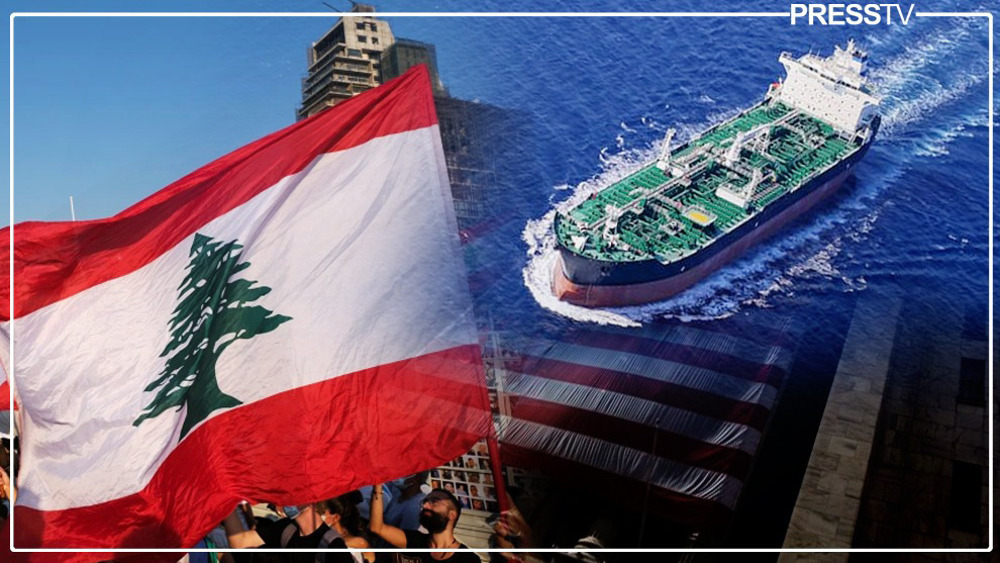Iranian fuel shipments to Lebanon exposed beneficiaries of sanctions, says political bloc
A Lebanese parliamentary bloc says Iran's fuel shipments to Lebanon exposed the true faces of all those who counted on benefiting from the US economic siege against Lebanon.
“The news of Iranian fuel tankers sailing toward Lebanon exposed the true faces of all those who counted on benefiting from the US economic siege against Lebanon, its people and its government, with the aim of subjugating and dominating the management of the country’s affairs and control of its policies,” the Loyalty to the Resistance Bloc said in a statement.
Fuel shortages in Lebanon have forced businesses and government offices to close, threatening to cause blackouts at hospitals and halt transportation and other vital sectors in the Arab country.
The plan to buy Iranian fuel, announced by Hezbollah Secretary-General Sayyed Hassan Nasrallah on August 19, marked a watershed in foiling the US sanctions, which have severely affected both countries.
Nasrallah warned the US and Israel that Hezbollah would consider the tanker and next Iranian ships as “Lebanese territory” from the moment they sail. He later stressed that the Lebanese resistance group did not have any political aspirations by importing fuel from Iran.
The first ship containing Iranian fuel entered Syria’s territorial waters last week to unload its cargo, expected to be then transferred to Lebanon via tankers. Informed sources said that two other Iranian ships will also deliver their cargo to Lebanon through the same mechanism.
The Lebanese bloc said the insistence of Nasrallah on helping the Lebanese people forced the Americans to rush through measures to maintain a say in the country’s affairs.
It noted that the resistance has clearly revealed to the Lebanese people the fragility of the American siege against the Mediterranean country and the so-called “Caesar Act” sanctions imposed by the US against Syria.
“It has also become clear that the stifling economic crisis that the Lebanese have suffered from would not have been exacerbated had it not been for the American policy of blackmail to exploit the pain and anguish of the Lebanese in order to make them surrender and dictate its policies to them,” the bloc added.
‘Credit largely goes to Nasrallah’
Syria agreed to transport Jordan’s electricity and Egypt’s gas to Lebanon on September 4, two days after the first tanker containing Iranian fuel entered Syria’s territorial waters.
According to the editor-in-chief of London-based online newspaper Rai al-Youm, by approving the request, Damascus has shown once again that it can rise above the wounded pride and petty considerations.
In an editorial published on Tuesday, Abdel Bari Atwan wrote that the agreement should help alleviate Lebanon’s crippling energy crisis.
“The credit is largely due to Hezbollah leader Hassan Nasrallah,” he noted. “By turning to Iran to supply oil and gas to Lebanon in defiance of the US and Israel, and pledging to protect incoming Iranian tankers from any attempted attack, he forced the US’ hand.”
He argued that Iran's fuel shipment forced the United States’ “hitherto imperious” ambassador, Dorothy Shea, to back down and turn to Jordan and Egypt for alternative solutions.
Just a few hours after Nasrallah’s August 19 announcement, Shea claimed that Lebanon did not need Iranian tankers, citing what she called “a whole bunch” of fuel ships off the coast waiting to unload.
She also said Washington would help Lebanon implement a plan to transfer Egyptian gas to Lebanon for power generation.
“In the process, she broke her own country’s blockade of Syria imposed under the so-called Caesar Act, exposing the fragility of the embargo and the success of Syria’s policy of strategic forbearance in contending with it,” Atwan added.
US fighter aircraft shot down ‘in friendly fire’ amid aggression on Yemen
Yemeni FM: Israel’s sponsors accountable for ongoing aggression on Sana’a
Eight Palestinians killed as Israel attacks Gaza school, hospitals
VIDEO | Rome, Milan host new protests in solidarity with Palestinians
Dec. 21: ‘Axis of Resistance’ operations against Israeli occupation
Spain jurists demand ties with Israel ties be cut
VIDEO | Press TV's news headlines
VIDEO | Iran honors top Science Olympiad medalists















 This makes it easy to access the Press TV website
This makes it easy to access the Press TV website